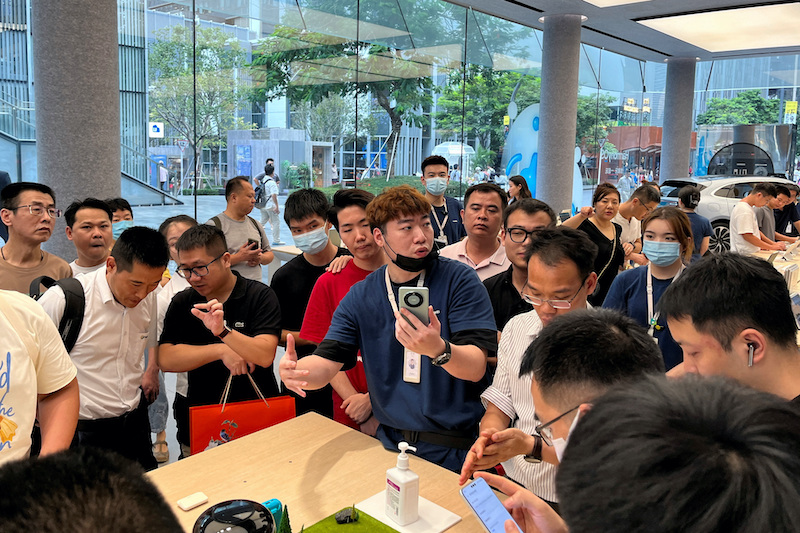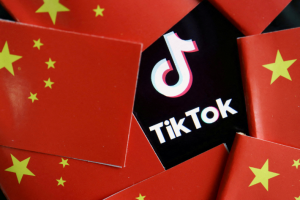Huawei Technologies’ breakthrough – in developing an advanced computer chip – has the potential to yield harsher outcomes for China, analysts say.
Given the intense rivalry between China and the US, Huawei’s ability make a phone powered by an advanced chip could spur greater chip restrictions from the United States, some now say.
Jefferies analysts said findings by TechInsights on Huawei’s Mate 60 Pro smartphone could trigger a probe from the US Commerce Department’s Bureau of Industry and Security and spur more debate in the US on the effectiveness of sanctions.
And that could prompt Congress to include even harsher tech sanctions in a competition bill it is preparing against China. “Overall the US-China tech war is likely to escalate,” they said in a note.
ALSO SEE: China Plans $40bn Bonanza for Chips After Huawei Breakthrough
The Mate 60 Pro smartphone unveiled last week has shown the Chinese tech giant’s determination to fight back against US sanctions, but such efforts are likely to be very costly.
However, China looks set to channel large sums towards the sector, with the government saying it plans a $40-billion investment fund to bolster the capabilities of its chip sector.
‘The result may be greater US chip curbs’
A teardown by Ottawa-headquartered TechInsights found the new Huawei phone is powered by a Kirin 9000s chip made by China’s top contract chipmaker SMIC, using an advanced 7-nanometre (nm) technology.
TechInsights’ findings and claims by early users about the phone’s powerful performance show China is making headway in developing high-end chips, despite Washington ramping up sanctions over the past year to cut its access to advanced chipmaking tools.
This “demonstrates the technical progress China’s semiconductor industry has been able to make without EUV tools. The difficulty of this achievement also shows the resilience of the country’s chip technological ability,” TechInsights analyst Dan Hutcheson said.
EUV refers to extreme ultraviolet lithography, used to make 7nm or more advanced chips.
“At the same time, it is a great geopolitical challenge to the countries who have sought to restrict its access to critical manufacturing technologies. The result may likely be even greater restrictions than what exist today,” Hutcheson said.
A US Department of Commerce representative did not immediately reply to a request for comment on Tuesday, while Huawei also declined to comment. SMIC and China’s State Council, which handles press queries on behalf of Beijing, did not respond to requests for comments either.
‘Generous subsidies helping to cut phone costs’
The most advanced chip SMIC had previously been known for making was 14nm, as it was barred by Washington in late 2020 from obtaining an EUV machine from Dutch firm ASML.
But TechInsights last year said it believed SMIC had managed to produce 7nm chips by tweaking simpler DUV machines it could still purchase freely from ASML.
Some analysts including Jefferies’ said there was also a possibility Huawei had purchased the tech and equipment from SMIC to make the chip rather than doing it in collaboration.
Whoever is making the chip, Tilly Zhang, an analyst at Gavekal Dragonomics, downplayed the success, citing a low yield rate which reduces the number of useable chips from each wafer and raises costs, and new export controls imposed by the Netherlands that will limit SMIC’s access to more immersion DUV machine.
“They have just demonstrated that they are willing to accept much higher costs than are normally considered worthwhile … It is only the combination of Huawei’s own large financial resources and generous government subsidies that could allow it to sell phones using these chips at normal market prices,” Zhang said.
China is set to launch a new state-backed investment fund that aims to raise about $40 billion for its chip sector, as the country ramps up efforts to catch up with the US and other rivals.
Some research firms forecast SMIC’s 7nm process has an yield rate below 50%, versus the industry norm of 90% or more, and it would limit shipments to around 2-4 million chips, not enough for Huawei to regain its former smartphone market dominance.
Jefferies analysts reckon Huawei is preparing to ship 10 million units of the Mate 60 Pro, though it may struggle to support that quantity with China-made 7nm chips.
In that case it could turn to 10nm chips, but with an estimated 20% yield, which refers to the number of working chips on each silicon wafer, Jefferies said, it would be far below the 90% for most consumer devices.
“The (US) controls are imposing high costs for producing controlled technologies in China,” Doug Fuller, a chip researcher at the Copenhagen Business School said, adding that the Chinese government was likely footing the bill.
‘Chinese military using 28nm chips’
News of Huawei’s advanced chip comes amid fresh claims that US chip sanctions may not be enough to deter China’s military ambitions.
A Stanford graduate revealed last week that engineers at Tsinghua, China’s top technology university, have indicated that export controls imposed by the US last October “may not fully accomplish Washington’s objectives and that the sanctions’ scope should expand”.
“Conversations with over 60 engineers on Tsinghua’s campus reveal the prevalence of continuous EDA (electronic design automation) software limitation workarounds and the downsides of only targeting the most advanced-node chips, as opposed to so-called ‘mature node’ chips that offer less density of processing power for a given physical size,” Christina Knight said in a report for the East Asia Forum.
“Several students at the School of Integrated Circuits at Tsinghua (a ‘chip college’ established in 2020 to foster China’s top semiconductor talent) noted that they can easily circumvent EDA restrictions,” she said, adding that “most military technology relies on less sophisticated chips” that are 28nm and above.
- Reuters with additional reporting and editing by Jim Pollard
ALSO SEE:
New Huawei Phone Spurs Fear China Got Around US Chip Curbs
ASML to Ship Top Tech to China Even as Dutch Chip Ban Starts
Chinese Tech Giants Rush to Buy Nvidia’s Top AI Chips – FT
Dutch Restrict Chip Exports Amid US Push to Tighten China Curbs
US Chip Sanctions Have Hardly Impacted China’s AI Capability
ASML, Lam See Strong China Demand for Less Advanced Chips
























